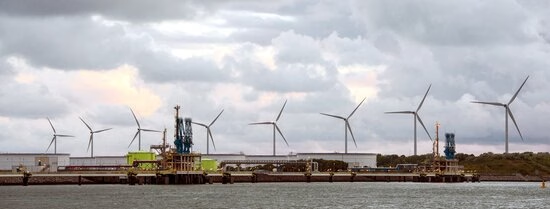PhD candidate Rick Bosman (DRIFT and Erasmus School of Social and Behavioral Sciences) investigated how established parties anticipate their new role during the energy transition. He found that organisations often find themselves in a 'transition space'. A term introduced by Bosman to better understand this phase, which is characterised by a lack of grip and direction.
The energy transition is causing major shifts in energy supply. For instance, a completely different infrastructure is needed to switch to electric driving and to make homes natural gas-free. For many large companies and organisations, this radically turns business operations upside down. Rick Bosman took a look behind the scenes at the Port of Rotterdam, network operator Alliander and pension fund ABP. During his PhD, he was one of the initiators of ABP fossil-free. Bosman: "Companies were used to operating in a stable context and now have to find a different role and new business models. This is quite exciting for many organisations."
The energy transition often leads to tension and conflict among those parties, he observes. Also at network operator Alliander (semi-government), where Bosman had many conversations with employees, among others. He saw an organisation that is looking ahead, for example when it comes to making residential areas natural gas-free, but that is also struggling. To respond to the increasing number of electric cars, the party also started installing charging stations. "This led to a number of lawsuits. They were knocked back by the market, which saw it as illegal competition. Alliander reasoned that if the market does not place the charging poles, they should pick it up themselves."
Transition space
The PhD candidate notes that people almost always talk about an old regime (fossil) and a new regime (renewable), but there is no term at all to describe a system where there is no clear regime. He therefore introduces the term 'transition space' in his dissertation. "A regime is characterised by a common direction and a lot of grip. In transition space, that grip is precisely what is missing. This is a phase with its own characteristics, but it still lacked language to describe it properly," he explains.
Crazy cocktail
Earlier transition thinking assumed that niches, such as startups with innovative ideas, slowly but surely topple the old regime. "The transition space is rather a crazy cocktail, where parts of the old regime are mixed with new elements from niches. We are largely phasing out fossil but a power grid remains important. That is why a network operator is such an interesting party because they play an important role in both the old and the new regime. An oil company is often still too much trapped in the old regime."
The Port of Rotterdam knocked on DRIFT's door because they wanted to get a better picture of what the energy transition means for the port. "Currently, half of what comes through the port is still fossil," Bosman says. The port authority initially saw itself as a kind of mall operator, regulating the facilities but having little influence on what is sold in the shops. DRIFT urged them to be more proactive in shaping the sustainable port. "To get a view on that, you don't have to call Shell right away, but also start talking to new parties. They have now set up a transition department of 50 FTE that is entirely focused on bringing in new sustainable activity."
"If you start poking and pushing into something, you can grasp and understand connections much better and it becomes clear where the real resistance to change is."
ABP fossil-free
During his PhD, Bosman was also one of the initiators of the fossil-free campaign at pension fund ABP. It did not feel right to him that he was obliged to put money away for the future, but that this money was invested in fossil fuels, putting that very future at risk. Pressure was exerted in every possible way to move away from fossil investments, for instance by sending letters, mobilising member groups and through the media (read Dutch newspaper Trouw, among others). "This was not only from a climate point of view, but also because fossil investments are increasingly a financial risk. If we want to contain climate change, a large proportion of fossil fuels must remain in the ground."
Activist research
The campaign was successful: in 2021, ABP announced it would stop investing in fossil fuels. At the same time, Bosman's research provided valuable insights on the course of transitions and the role of campaigning in them. While acknowledging the activist nature of the ABP case, the PhD candidate sees this as a strength. For his new job, he is involved in the appeal case against Shell from Milieudefensie as a researcher. "I don't believe that as a scientist you should only observe from a distance. If you start poking and pushing into something, you can grasp and understand connections much better and it becomes clear where the real resistance to change is."
- More information
Rick Bosman defends his dissertation 'Into Transition Space: Destabilisation and incumbent agency in an accelerating energy transition' on Friday 18 November 2022.
- Related content

